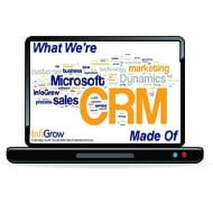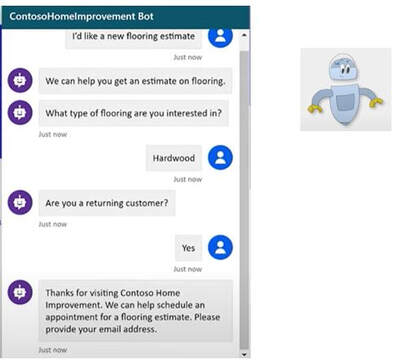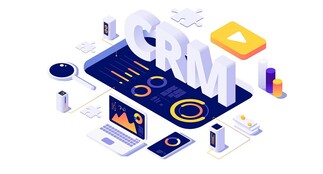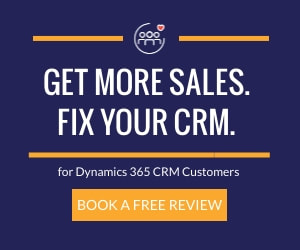See your organization thrive! Improve the customer experience by keeping your sales, marketing
and customer service teams on the same page.
and customer service teams on the same page.
�
|
Dear Bob, My account reps just don't prospect or even follow up on leads we provide! What can I do? - Barb Dear Barb -
One of the challenges that we often see from a CEO is really trying to drive account managers to do prospecting and to reach out and follow up on leads. A CRM system provides vision into what is happening, or not happening with leads provided to the account manager as well as vision of the sales VP and CEO. You’ve heard that old saying “You can lead a horse to water but you can’t make him drink”. I often hear managers complain that their CRM doesn’t work because they don’t have enough user acceptance. Well “leading a horse to water” is the same type of dilemma. Two basic principles must be in place to achieve user acceptance of a CRM system.
“What is in it for them” is all about giving the end-user what they need to be more productive. Dynamics 365 CRM can’t be laid on as more work. It must cut down work and make it easier for the end-user to do their job. You reduce their daily tasks and deliver in one place the information that they have been scrambling to collect from other sources. You achieve this first principle and you will have a CRM system that can’t be pried away from users in six months.
Dear Bob,
What is the best way my customers can use CRM to be better Marketers? - Jane Dear Jane, It’s not hard to see why CRM data, made up of customers, prospects and influencers is the most important marketing asset. After all, how can a marketer be successful without the right data? And how can a marketer discover or fine tune a message without insight into behaviors and their service needs? But, keeping this data organized, current, and easily accessible for every relevant team member, throughout an organization, can still be a massive challenge. A versatile, robust CRM system is still the best way to store, manage, and use critical customer data for sales AND marketing. However, many marketers who invest in a CRM system fail to fully capitalize on its marketing value. Most CRM systems fail because upper management, IT, marketing, sales, customer service, and others who use the software do not establish clear, well-defined, measurable goals. Consequently, it can be difficult or impossible to determine the effectiveness of a CRM system.
This happens because CRM is often thought of as a technology solution for a company's business; however, CRM is a really a business solution. Even if when your company deployed CRM you did not have defined measurable goals or had ill-defined goals, you can “mend" a failed Dynamics 365 CRM, in four simple steps. Dear Bob, My account managers have limited time and with so much distraction they often appear to not know what to focus on. How do I help them? -- James, Sales Manager Dear James, Sellers do have limited time, and in deciding how to focus many rely on guesswork or intuition. That leads to sub-par decisions and incomplete actions when interacting with customers or following a sales process. Here are 4 steps you can start taking today to help them improve their outcomes. 1. Cut anything that is not sales related. When organizations assign or let account managers perform customer service tasks or get involved with marketing, they are providing a manager with the number one excuse for not selling. Dear Bob - My CEO is frustrated with the lack of progress the sales team appears to be making with the Dynamics CRM system we installed two years ago. How do I help her move the effort forward? I too must have an effective CRM with current customer and prospect data to meet my needs. -- A Concerned Marketer Dear Concerned Marketer -
I expect the frustration your CEO is experiencing with not achieving the expected value out of the Dynamics 365 CRM is around all ROI. The evidence I usually see includes: missed or no alignment between sales and marketing, an ineffective sales pipeline, data silos dependent on Excel files for marketing-sales-service, no one-view of the customer engagement, just to name a few. You, with our help, can resolve this frustration for your CEO with a four-step exercise I have developed. Bob, I just lost 45-minutes of my life, that I can’t get back, dealing with a dumb chatbot and then waiting for real person online to resolve a simple issue. What can I do not to put my customers through the same pain? -- Frustrated Bill Dear Bill, We have all encountered service bots that are not as smart as we would like. Well Microsoft's newest member of the Power Platform, Power Virtual Agents, looks like to be heading in right the direction for smarter Chatbots. These bots feed off Dynamics CRM and the Common Data Platform, which opens up a whole lot more connections to other data sources. In addition, with the power of Microsoft’s AI behind the bots, these chatbots can learn how to improve. Some examples of smarter bots that might apply to your business:
Bob -
Do you support other CRMs? -- Tracy Dear Tracy, First, success with CRM has little to do with the software itself. It has to do with knowing and aligning a client’s business processes with the software selected. With any client our upfront discovery and analysis effort on a CRM project can be applied to most CRMs. Due to our approach - it is not about the technology, it is process and changing behaviors - we are able to work with clients who have other CRMs. After our work we will then help the client find a partner that best fits their needs. Bob,
I have a client who is a CFO and she is concerned that her sales team is rapidly becoming Zoom-Zombies on time-consuming internal web meetings. Isn’t there a way could help them see that they could be using our Dynamics 365CRM to help their team work better from home? Jack Dear Jack, Meetings aren’t all bad – and can be a great way to stay socially connected. However, we know that in general internal meetings are:
What is Marketing Automation?What is so special about Marketing Automation vs. continuing to drop bulk emails?
-- Amy Dear Amy, If you are concerned about the low click-rates of your bulk emails, or being seen as a spammer, or your messages always only “selling” this week’s special offer, then you might want to look beyond bulk emails and at marketing automation. Generating leads and acquiring new customers is the lifeblood of every organization. Many organizations believe that satisfied customers and referrals are their best sources of leads. That’s certainly a sound principle and something to strive for but unless you’re measuring and tracking where your leads are coming from, this belief is anecdotal and little more than company lore.
Dear Bob, We have been using a CRM for almost five years and I am still seeing sales users avoid it as much as possible. What can I do to help them recognize the value to them and for our growth? -- Amy, frustrated marketer Dear Amy,
I am sure you have heard the saying – You can lead a horse to water, but you can’t make them drink. Your efforts need to be focused on the “What’s in it for them” approach. Package your training and communications on what the benefits are and productivity savings they get out of using Dynamics 365 CRM. Today's CRM (Customer Relationship Management) is better than yesterday's because: (a) CRM systems such as Microsoft Dynamics 365 CRM can now deliver greater productivity returns and (b) vendors' software usability is much improved. These advancements (and others) mean less time and lower costs to implement a CRM system. And the more people in a given company who use a CRM system translates to more benefits and a higher ROI on a CRM investment. Research notes that for every dollar a company invests in a CRM system, it earns $5.60.
But not everyone who has a CRM system is experiencing the expected return and, thus, some are even Microsoft Dynamics 365 CRM haters. It may depend on how you choose and implement your CRM system. To help you get the most from your CRM, here are some common mistakes and ways to avoid them. Want more and better leads? Of course you do!
The key to getting rock-solid sales leads is understanding your best lead sources – and how you can find more prospects just like your best customers. Customer relationship management software like Dynamics 365 for Sales / Dynamics CRM can help you:
If you’re in a sales management or executive position within your company, see if you can easily answer these three questions: If your account reps could sell more, marketing could target better, and customer service was more responsive to key accounts, life would be great, wouldn't it? It may not be as hard as you think using CLV with Microsoft Dynamics 365 CRM.
You’ve probably heard that it costs less to keep and grow an existing customer than to acquire a new one. And it’s true. But, for many organizations this truism seems to have fallen on deaf ears, as companies still spend a large amount of their time and resources on chasing after new, potential clients. Even then, their efforts can be fragmented and the results less than desirable. This is hard to understand because keeping and growing current customers, and finding new ones like them does not have to be hard. What an interesting week we had. It just underscored how important it is to approach working Dynamics 365/CRM from a process and change management vantage point rather than as a technology. We saw the following:
Most customers who have, or are looking to purchase a Dynamics CRM system are looking to achieve basic results which boil down to two frequently stated objectives: retain current customers and acquire new customers to power growth. Both of these objectives rely on extensive understanding of customer relationships grounded in business data such as account details, sales history, end use information, industry assessment, response to campaigns, etc. If the business does not win through the transformation of time-sensitive management of this data to systems that provide not more data, but useful information and insights, they will lose to competition who are leading in this strategic approach. If your customers are not moving to this new business reality, then they are falling behind.
Marketing Automation software serves a company's marketing department beyond what a Dyanmics CRM system does, and a CRM system serves sales and other departments. When integrated, Marketing Automation and Dynamics 365 CRM tools enhance each other, resulting in even more and better-qualified leads and, ultimately, more sales and satisfied customers. If you have one of these productivity tools, here are reasons to have both, in a single, centrally located, easy to use, integrated system.
How many opportunities in your world today are decided by a single decision-maker? I suggest that many are not. It also is highly likely that the sales process of your clients is running the same as they work to build a trusting relationship with multiple decision-makers or decision influencers. A recent study found that there are 6.8 people involved in the average B2B buying decision, yet a LinkedIn study reported that 78% of sales professional are connected to either only one person or not connected at all into accounts they’re trying to close. Are account managers communicating with the other 5+ people in the decision-making process? Are they helping all the people involved get the background information they need to help make an informed decision?
Most software ROI calculations are built off of two tenets: sell more or cut cost. The problem that most organizations run into is that they have no solid numbers to address either; “sell how much more”, or “save how much time” are elusive concepts.
I suggest that there are three fundamental business objectives that sales, marketing and service must focus on: find more customers like our best ones, keep the ones we want, and increase profitable transactions. The way to justify a Dynamics 365 CRM system is to start by asking: "What is the cost of inaction in effectively supporting and measuring progress associated with these three fundamental business objectives?" The most fundamental requirement for growing a business is having sound sales processes that can be tracked, measured, and audited. Such processes must be written down and followed closely, not shared through word-of-mouth like an urban legend. A documented sales processes allow your clients to create a repeatable blueprint for success.
So where do they keep such data and monitor their results? I am often asked by managers how to improve the user acceptance of their Dynamics 365 CRM system. In the eyes of the questioner, the answer lies in how to encourage, or even make, users use the platform more, in order for the organization to achieve their established expected benefits of investing in Microsoft CRM. That’s the wrong focus. The issue is not how do we get the user to use CRM, but rather, is the Dynamics CRM itself designed to be useful to the user so that they want to use it. Although the difference is subtle it should not be overlooked.
As reported in DestinationCRM.com, the most recent “CMO” Spend study by Gartner showed marketing budgets falling from a high of 12.1% of company revenue in 2016 to 11.3% in 2017. While cuts have varied across industries, retail and manufacturing were the hardest hit. While retail is going through some major changes, the study suggests that “manufacturing is adapting to emerging yet complex B2B2C opportunities”.
Leads can come in many ways; website, referral, trade show, direct mail, email drip and even an account rep prospecting. But if we don’t know the sales return from each or the cost of each, how do we evaluate where to invest a limited marketing budget?
The growth of Artificial Intelligence (AI) in the Internet of Things (IOT) world is steadily moving into the sales, marketing and customer service applications. Sentiment and emotion analytics market is set to explode, from $123 million currently to $3.8 billion by 2025 according to a report from the research firm Tractica. (Customer Relationship Management, May 2018).
The report states that the top three use cases for sentiment and emotion analysis will be customer experience, product and market research, and customer service. An example offered of affecting the customer experience would changing the in-store LDC displays in response to the emotions detected on the faces of shoppers walking the aisles. |
HOME | SERVICES | SOLUTIONS | BLOG | WHY INFOGROW | CONTACT US |
Address2140 Front Street
Cuyahoga Falls, OH 44221 |
Telephone |
|
© 2024 InfoGrow Corporation




























